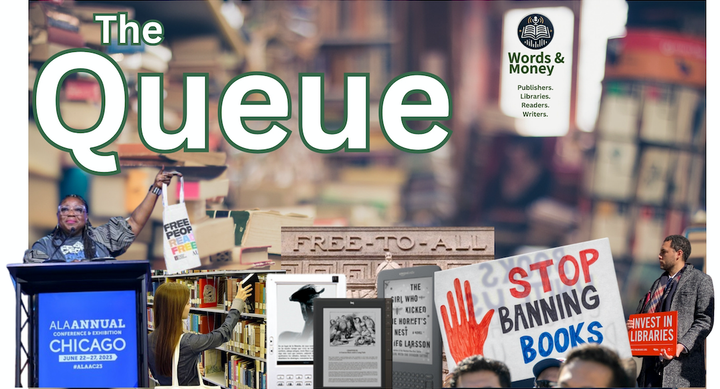Court Temporarily Blocks Trump Administration's Destruction of IMLS
The IMLS is clinging to life after a federal judge issued a temporary restraining order on May 1, just 24 hours after oral arguments in Washington D.C. in a case brought by the American Library Association.

In a speedy ruling, federal judge Richard J. Leon on May 1 issued a Temporary Restraining Order (TRO) blocking the Trump administration from further dismantling the Institute of Museum and Library Services until the court can more fully rule on the merits of the plaintiff American Library Association's motion for a preliminary injunction. But in a promising sign for ALA, the court signaled that an injunction is almost certainly coming, pending further consideration by the court.
The decision comes in a closely watched lawsuit filed by the ALA on April 7 in federal court in Washington D.C., joined by AFSCME/AFL-CIO as co-plaintiffs. The suit claims the Trump administration's bid to destroy the IMLS and six other agencies as laid out in a March 14 executive order is unconstitutional and in violation of the Administrative Procedure Act.
In finding for the plaintiffs, the judge ordered that IMLS shall not "place any additional IMLS staff" on administrative leave; shall not "terminate the employment" of any IMLS staff; and shall not "further pause, cancel, or otherwise terminate IMLS grants" for reasons other than noncompliance.
Leon also ordered the parties to submit a joint status report on next steps, including whether the parties will require supplemental briefing on the preliminary injunction, and if so, a briefing schedule.
In their initial motion for a preliminary injunction, the ALA had asked for the court to rule by May 4, the date upon which the agency was reportedly set to formally terminate IMLS staff, some 85% of which are currently on paid administrative leave.
Leon, however, a conservative judge appointed by George W. Bush, delivered his decision just 24 hours after hearing oral arguments on April 30, after agreeing to convert the plaintiffs' motion for a preliminary injunction into a motion for a Temporary Restraining Order, a not uncommon move used to "preserve the status quo" while an injunction is more fully considered. In a stinging footnote (replete with an exclamation point) Leon noted that DOJ lawyers lodged an objection to that conversion with "no apparent legal basis to support it!"
In his six-page ruling, Leon appeared to have little trouble finding for the ALA.
"First, [the plaintiffs] have shown a substantial likelihood of success on the merits," the judge wrote. "The wholesale termination of grants and services and the mass layoffs appear to violate the clear statutory mandates outlined in the MLSA. Moreover, defendant's conduct contravenes Congress's appropriation of almost $300 million to IMLS. Plaintiffs are therefore likely to succeed in showing that defendants actions to unilaterally shutter IMLS violate, at minimum, the Administrative Procedure Act."
Leon went on to find that the plaintiffs also easily satisfied the second prong needed for injunctive relief: irreparable injury. "Plaintiffs point to myriad harms," Leon concluded, citing myriad evidence of "grant terminations, loss of access to IMLS expertise and services, the loss of access to IMLS data," as well as evidence that "libraries have been forced to end programs midstream, fire employees, and in some cases, completely shutter."
Such harms are "not merely economic," the judge held, and are neither "speculative, nor remediable."
And, in combining the third and fourth prongs "the balance of equities" and "the public interest," Leon also had little trouble finding for the plaintiffs.
"Defendants assert that disrupting IMLS efforts to comply with the executive order harms the public interest, but the court finds that the public interest in compliance with MLSA mandates and in preserving crucial access to library services outweighs defendant's claimed interest."
In a lengthy 59-page opposition brief filed on April 21, DOJ lawyers had argued that the ALA lacked standing to pursue their claims in federal court, suggesting that disputes over layoffs and canceled grants belonged in other venues, such as the federal court of claims, and that the ALA’s claims were "unripe" because IMLS wasn’t really being shut down, but was is in the early stages of a restructuring.
In their April 28 filing, ALA lawyers countered that characterizing the termination of 85% of the agency’s staff and freezing the processing of grant funds as "administrative decisions" was "absurd,” and argued that Trump's executive order “effectively repealed" the Museum and Library Services Act.
Leon agreed, and in perhaps the most telling sign of potential success for the ALA in the case, he dispatched with the government's defense brief with a single footnote: "At the outset, the court finds that plaintiffs will very likely be able to establish they they have standing, that this case is ripe, and this court has jurisdiction," Leon wrote.
Still, the case is far from over and the future of IMLS remains far from certain. In filing their suit, the ALA is seeking an order that would "return IMLS and its employees and grantees to their status prior to March 31, 2025," including the reinstatement of all employees, and the restoration of funding to both the agency and its grantees.
This TRO is a long way from that, but, ALA officials said, it's a start.
“The immediate halt to the gutting of IMLS is a win for America's libraries and the millions of Americans who rely on them," ALA President Cindy Hohl said, in a statement. "ALA is encouraged that the court recognizes the immediacy of the need for IMLS and library services at risk. The temporary restraining order will stop the dismantling of IMLS while the court considers the merits in this case.”
Meanwhile, ALA is also in the process of working with Congress on funding for IMLS in the FY 2026 Budget. “There is one final wall of defense against destruction of federal funding for libraries," Hohl added. "Constituents who tell elected leaders to continue providing libraries the federal resources that bring opportunity to millions of Americans."
Meanwhile, more clarity could soon be on the way in a case brought in Rhode Island federal court last month by 21 state attorneys general. That case, which was heard by federal judge John G. McConnell on April 18, follows a similar legal script, with the plaintiff states also seeking an injunction that seeks to save the IMLS and six other agencies targeted in Trump’s March 14 executive order. A decision is expected any day now.


